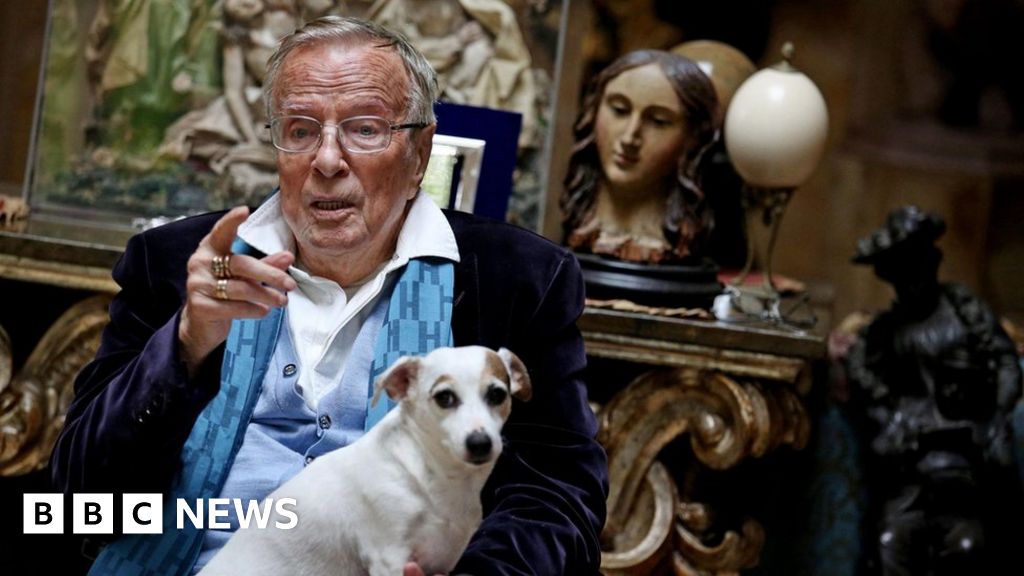The Italian legend was famous for his opulent Shakespeare adaptations and staging of lavish operas with Maria Callas and others.
Franco Zeffirelli, whose opulent set designs and sweeping directorial style bolstered operatic films, religious epics and Shakespearean love stories, has died. He was 96.
The Italian legend, who was nominated for an Academy Award for directing his innovative version of Romeo and Juliet (1968), died Saturday at his residence in Rome "without suffering," his son Pippo told The Hollywood Reporter.
Romeo and Juliet, which starred then-unknown teenagers Olivia Hussey and Leonard Whiting, also received a best picture nomination and garnered Academy Awards for cinematography and costume design, indicative of Zeffirelli's visual emphasis (he also penned the screenplay).
The film introduced a new generation to Shakespearean tragedy, created notoriety at the time for showing Hussey topless and was a big hit for Paramount when the studio was in dire need of one.
A year earlier, Zeffirelli wrote and directed an adaptation of another Shakespeare classic, The Taming of the Shrew, starring Elizabeth Taylor and Richard Burton at the peak of their careers. And in 1990, he helmed a well-received Hamlet, toplined by Mel Gibson, then known as an action hero, and Glenn Close.
On the casting of Gibson, Zeffirelli once said, "He gave a magnificent performance [in the first Lethal Weapon]," he said. "I thought, 'That's it. He is attractive, he is naughty, he is dangerous.' "
Zeffirelli staged opera in an epic style and drenched movies in the pathos of opera. His works were unabashedly sweeping extravaganzas that were popular with tourists and moneymakers for such auspicious venues as the Metropolitan Opera in New York.
His lavish romantic style was, at times, overly saccharine, as seen with The Champ (1979), the boxing-movie remake starring Jon Voight, Faye Dunaway and Ricky Schroder, and Endless Love (1981), which starred a young Brooke Shields (and, in his film debut, Tom Cruise). Zeffirelli's first cut on the latter received an X rating.
His religious epics were traditional and blessed by the Vatican. In 1972, he directed Brother Sun, Sister Moon, about the life of St. Francis of Assisi, and five years later helmed the international miniseries Jesus of Nazareth (with Hussey playing the Virgin Mary).
His other directorial turns included the operatic La Traviata (1982) and Otello (1986), both starring the Spanish tenor Placido Domingo. For La Traviata, he earned another Oscar nom for art direction-set decoration.
Since his work on Verdi's Falstaff in 1964 under the musical direction of Leonard Bernstein, Zeffirelli directed other operas including Tosca and Norma (both starring Maria Callas), Anthony and Cleopatra, Pagliacci and La Traviata.
His direction of La Boheme in 1981 with Teresa Stratas and Jose Carreras was one of the most extravagant productions in the history of the Met (he led about a dozen productions for the famed opera house). For that opus, Zeffirelli created all the ornate, lavish sets.
He received five David di Donatello Awards from his native country during the course of his career.
He was born in Florence, Tuscany, on Feb. 12, 1923, the product of an affair his mother had with a cloth salesman. His mom wanted his last name to be Zeffiretti — after the title of an aria in Mozart's opera Idomeneo, the word means "little breezes" — but an error in transcription dashed that. She died when he was just 6.
Educated at the Academia di Belle Arti in Florence, Zeffirelli first studied architecture, but after seeing Laurence Olivier's Henry V (1944), he decided to make a career in theater. He won acclaim as an actor, hailed as the Italian Montgomery Clift.
In 1945, Zeffirelli began work as a set designer at the Teatro della Pergola in Florence. While there, he met director Luchino Visconti, who was to become his mentor and communicated to Zeffirelli his passion for opera.
For much of the 1950s and '60s, Zeffirelli concentrated on theater and opera, designing costumes and sets and directing. He helmed a wide range of productions from Shakespeare to Tennessee Williams. His ornate works were largely popular successes staged in Europe's leading venues — the Old Vic, the National and the Comedie-Francaise.
In 1970, at the Pope's request, Zeffirelli staged "Missa solemnis" in honor of the 200th anniversary of Beethoven's birth.
At the Old Vic in 1960, he staged Romeo and Juliet, starring an unknown Judi Dench. It was real, raw and energetic. “I went back to blood, heat and Shakespeare, who wrote about a violent, riotous society full of love and tears,” he told the Times of London.
Young Toscanini, his 1988 biopic of conductor Arturo Toscanini starring C. Thomas Howell, was determined to be unreleaseable in the U.S.
Rhett Bartlett contributed to this report.
Let's block ads! (Why?)
https://www.hollywoodreporter.com/news/franco-zeffirelli-dead-romeo-juliet-920639
2019-06-15 12:01:03Z
52780315041934






